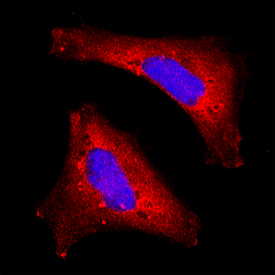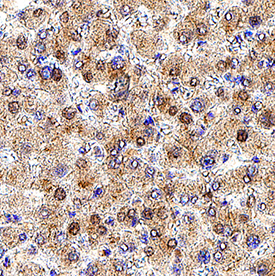Human Dihydrolipoamide Dehydrogenase/DLD Antibody
Human Dihydrolipoamide Dehydrogenase/DLD Antibody Summary
Ala36-Phe509
Accession # P09622
Applications
Please Note: Optimal dilutions should be determined by each laboratory for each application. General Protocols are available in the Technical Information section on our website.
Scientific Data
 View Larger
View Larger
Dihydrolipoamide Dehydrogenase/DLD in HeLa Human Cell Line. Dihydrolipoamide Dehydrogenase/DLD was detected in immersion fixed HeLa human cervical epithelial carcinoma cell line using Mouse Anti-Human Dihydrolipoamide Dehydrogenase/DLD Monoclonal Antibody (Catalog # MAB8646) at 8 µg/mL for 3 hours at room temperature. Cells were stained using the NorthernLights™ 557-conjugated Anti-Mouse IgG Secondary Antibody (red; Catalog # NL007) and counterstained with DAPI (blue). Specific staining was localized to cytoplasm. View our protocol for Fluorescent ICC Staining of Cells on Coverslips.
 View Larger
View Larger
Dihydrolipoamide Dehydrogenase/DLD in Human Liver Tissue. Dihydrolipoamide Dehydrogenase/DLD was detected in immersion fixed paraffin-embedded sections of human liver tissue using Mouse Anti-Human Dihydrolipoamide Dehydrogenase/DLD Monoclonal Antibody (Catalog # MAB8646) at 5 µg/mL for 1 hour at room temperature followed by incubation with the Anti-Mouse IgG VisUCyte™ HRP Polymer Antibody (Catalog # VC001). Before incubation with the primary antibody, tissue was subjected to heat-induced epitope retrieval using Antigen Retrieval Reagent-Basic (Catalog # CTS013). Tissue was stained using DAB (brown) and counterstained with hematoxylin (blue). Specific staining was localized to cytoplasm and nuclei in hepatocytes. View our protocol for IHC Staining with VisUCyte HRP Polymer Detection Reagents.
Reconstitution Calculator
Preparation and Storage
- 12 months from date of receipt, -20 to -70 °C as supplied.
- 1 month, 2 to 8 °C under sterile conditions after reconstitution.
- 6 months, -20 to -70 °C under sterile conditions after reconstitution.
Background: Dihydrolipoamide Dehydrogenase/DLD
Dihydrolipoamide dehydrogenase (DLD), also known as LADH, is an NAD-dependent oxidoreductase in the mitochondrial matrix (1). DLD serves as the E3 subunit of four mitochondrial enzyme complexes: pyruvate dehydrogenase, alpha-ketoglutarate dehydrogenase, branched chain alpha-ketotacid dehydrogenase, and the glycine cleavage system (2, 3). It is active as a 120 kDa dimer that catalyzes oxidation within these enzyme complexes. Several mutations of human DLD have been described, some of which contribute to the loss of respiratory function during oxidative stress (4, 5). DLD mutations located at the interface between dimer subunits can impair dimer formation (5, 6). The involvement of DLD in the regulation of lipid peroxidation and lactate metabolism is important for mouse hippocampal neuroblast proliferation and hamster sperm capacitation, respectively (7, 8). DLD polymorphisms in insects can increase their resistance to the pesticide phosphine gas, while they can increase the sensitivity to arsenite in the nematode C. elegans (9). Mature human DLD shares 95-96% amino acid (aa) sequence identity with hamster, mouse, and rat DLD. Alternative splicing generates additional human DLD isoforms that lack the N-terminal 99 aa or carry a deletion of aa 147-194.
- Brand, M.D. (2010) Exp. Gerontol. 45:466.
- Johnson, M.T. et al. (1997) Proc. Natl. Acad. Sci. USA 94:14512.
- Sundquist, A.R. and R.C. Fahey (1988) J. Bacteriol. 170:3459.
- Ambrus, A. et al. (2011) Hum. Mol. Genet. 20:2984.
- Vaubel, R.A. et al. (2011) J. Biol. Chem. 286:40232.
- Babady, N.E. et al. (2007) Proc. Natl. Acad. Sci. USA 104:6158.
- Calingasan, N.Y. et al. (2008) Neuroscience 153:986.
- Panneerdoss, S. et al. (2012) J. Androl. 33:699.
- Schlipalius, D.I. et al. (2012) Science 338:807.
Product Datasheets
FAQs
No product specific FAQs exist for this product, however you may
View all Antibody FAQsReviews for Human Dihydrolipoamide Dehydrogenase/DLD Antibody
There are currently no reviews for this product. Be the first to review Human Dihydrolipoamide Dehydrogenase/DLD Antibody and earn rewards!
Have you used Human Dihydrolipoamide Dehydrogenase/DLD Antibody?
Submit a review and receive an Amazon gift card.
$25/€18/£15/$25CAN/¥75 Yuan/¥1250 Yen for a review with an image
$10/€7/£6/$10 CAD/¥70 Yuan/¥1110 Yen for a review without an image

